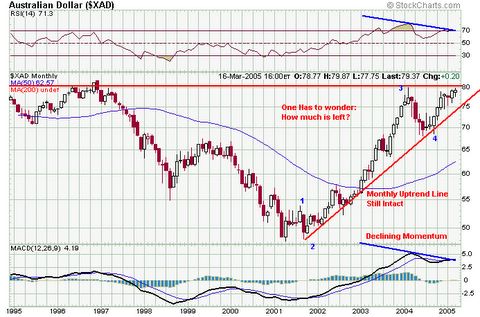
By the time you see covers like that, trends are well estabablished.
Where was the warning about the US$ two years ago or even 1 year ago? Indeed, big money is not often made on front page news. Big money is made on page 16 news that is headed to page 1. The Euro was probably on page 16 in 2002. Now look at it. "The Shrinking Dollar" has been on page one of the Wall Street Journal for months and just made the big time with the cover of Newsweek. Is there anyone out there that is not aware of the plight of the US dollar?
Let's review the fundamentals,and then we can look at a few charts.
1) The Trade Deficit
In January the Trade Deficit hit an All-Time High of $665.9B. Foreigners finance our debt to the tune of two billion dollars a day. We are consuming close to 80% of the world's savings and we are not using that money for investments, we are using it for consumption. The US is on a binge of buying houses, SUVs, vacations and everything else. Fueled by rising asset home prices consumers are spending the equity in their houses and them some. The trend is unsustainable of course, but as long as it continues the problem will get worse and the US$ will likely continue sinking.
2) US Gov't Deficit Spending
Is there a fiscal conservative left? Who? Where? OK representative Ron Paul from Texas is one, but one vote is hardly enough to pass a good bill or defeat a poor one. President Bush seems hell bent on guns and butter spending while refusing to roll back massive tax breaks that even Greenspan now admits to being a mistake. Given that Congress just yesterday voted down "paygo" rules, we clearly have both a President and a Congress that have shown zero fiscal restraint. The sad thing about this fiscal irresponsibility is that it created no jobs in the US although it did create an enormous number of jobs in China and India. Private sector jobs in the US shrank during Bush's first term in office.
OK those are the fundamentals but what do the charts say? Let's take a look:

Euro Weekly

Australian Dollar Weekly

British Pound Weekly

Euro Monthly

Australian Dollar Monthly
As you can clearly see, Newsweek is rather late in the "Shrinking US$ Story".
The Euro has rallied from below 90 in April 2002 to over 130 right now for a gain of approximately 50% bottom to top.
Eliott Wavers need to bear in mind that although I traced out 5 wave patterns on these charts, there are other valid counts that suggest these trends can continue for quite some time. Indeed even the 5th wave up could keep subdividing higher for quite some time. The uptrend lines are still intact and shorting breakdowns in the Euro thinking the trend was over have been as ill advised as trying to pick a top on home builder stocks.
Fundamentally anyway, the US$ probably should keep falling. That said, a prudent person has to be aware of the duration of this move as well as the current excessive sentiment against the US$ and at least wonder if covers like Newsweek's "Incredible Shrinking Dollar" just might be mark a temporary peak.
Everyone now "knows" the US$ will keep falling. Will it? Still, the trend is the trend is the trend until it isn't.
What could cause the US$ to rally from a fundamental viewpoint?
1) Congress or the President could show some fiscal prudence
2) Social Security reform does not pass
3) Greenspan keeps hiking
4) Consumers finally throw in the towel on spending
5) Banks tighten lending standards
6) A blowup in the stock market and/or corporate bonds
7) A collapse in the US housing market
8) A collapse in home building even if home prices themselves stay lofty for a while longer
9) Rate cuts in Europe and/or trashing of the Stability Pact to allow larger deficits
10) Rate Cuts in the UK
Of those, I am only going to rule out #1. The rest certainly are possible and eventually most of them are likely. #8 could in fact trigger a cascade of 8-7-6-5-4-2 but would probably reverse or at least halt #3. The problem with playing for that cascade is that it could easily be precipitated by a panic collapse of the US$ rather than a collapse in housing or the stock markets.
My current inclanation, however, is that too many people are too focused on the "plight of the dollar" right now. A panic move is likely at some point but my "hunch" is that it will come later rather than sooner (after everyone gives up on it). In the meantime, watch those trendlines.
Mish









No comments:
Post a Comment